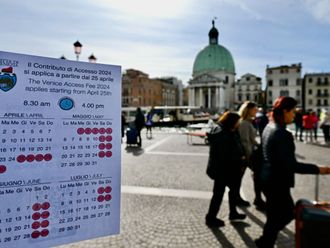Dubai: As the political turmoil continues to unfold in the neighbourhood, the UAE stands to benefit from a change in tourist patterns, particularly from those coming from Bahrain.
"Many are coming from Bahrain; this can be seen in hotels which have got an increase in requests from Bahraini companies to host conferences and meetings originally meant to be held in their own country," said Peter Goddard, managing director, TRI Hospitality Consulting.
Arrivals from Bahrain have also been boosted by incentives offered by the Bahraini carrier Gulf Air.
"Both Dubai and Abu Dhabi have been affected positively from the unrest in the region; Dubai has seen a stronger impact on its tourism market than Abu Dhabi," said Goddard.
Dubai Airports figures show an increase of seven per cent in passenger traffic during the first quarter of the year compared with a year before, while Abu Dhabi Airports Company announced that the capital received more than 2.8 million passengers, an increase of 9.4 per cent over the same period last year.
The largest increases in passenger numbers during March were on routes to and from the Arab region. According to Basel Abu Al Rub, co-founder of the Dubai-based travel agency Utravel, the cancellation of events such as the Formula One scheduled for March 13 in Bahrain also played a big part in shifting traffic to the UAE.
Visa restrictions
"This leaves the capital of the UAE as the sole city hosting the F1 race in the Middle East," said Al Rub. "This is a long-term effect which will divert regional F1 fans [individuals and corporate] to the Yas Marina Circuit in Abu Dhabi."
Local hotels have obviously been beneficiaries. According to figures released by STR Data, occupancy rates in Dubai hotels reached 76.6 per cent in January, a 7.9 per cent increase over the same period last year. Likewise, Abu Dhabi's occupancy rose to 60.9 per cent from 50.2 per cent.
"Hotels in Dubai have benefited from the turmoil in other countries as demand has diverted from these locations to Dubai," said Goddard. "Hotels were reporting occupancies in excess of 80 per cent in April."
However due to visa restrictions, the UAE experienced a drop in arrivals from Libya, Egypt, Lebanon and Syria.
"We are experiencing tightening restrictions on some Middle Eastern nationalities seeking tourist visas to the UAE," said Al Rub.
"This in turn decreases the number of regional tourists entering the country for tourism purposes.
"As a tour operator and travel agent, we have seen a decrease of approximately 5 to 10 per cent in numbers of regional tourists coming in from these countries."
IATA data for air traffic shows that both Egypt and Tunisia fell by 6.2 per cent as airlines cut 32 per cent of their flights to and from Cairo in the first quarter of this year.
Visa restrictions for Libyan tourists have also led to a decline in medical tourism.
"North Africans, especially Libyans, are big spenders in the medical tourism sector whereby they come to the UAE to enjoy its advanced medical services," said Al Rub.
"With the current turbulent events in Libya, we are seeing a decrease of more than 60 per cent in medical tourists as procedures become harder, airports are closing down and people are feeling less safe to travel at the moment."












